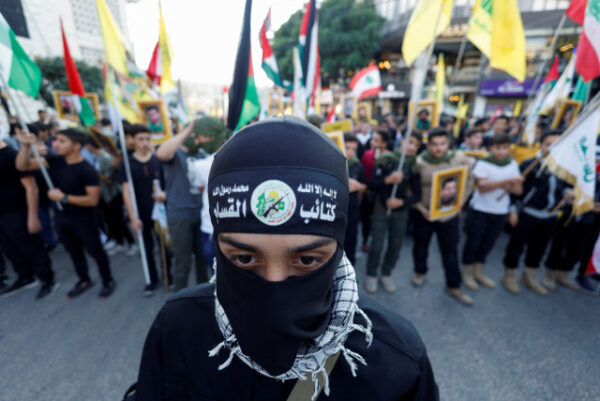By Tom O’Connor
Hamas has announced the establishment of a new partner group in Lebanon in a bid to rally support among Palestinians across Israel’s northern border amid the ongoing war in the Gaza Strip.
In a statement published Monday, Hamas‘ media office in Lebanon announced the creation of the “Vanguards of the Al-Aqsa Flood,” referring to the Palestinian movement’s name for the campaign it launched against Israel in an unprecedented October 7 surprise attack. As battles continued amid the Israel Defense Forces’ (IDF) most intensive campaign in Gaza to date, Hamas called on “Palestinian youth to join” the new group, “emphasizing the role of the Palestinian people, wherever they are, in resisting the occupation by all available and legitimate means.”
The IDF is already engaged in cross-border hostilities with Lebanon’s powerful Hezbollah movement, with which Hamas has fostered close ties in recent years. Hamas did not explicitly mention a military role for the new Vanguards of the Al-Aqsa Flood, but referred to the project as “an effort towards the participation of our men and youth in the project of resisting the occupation and benefiting from their energies and scientific and artistic capabilities.”
“O sons of our people, you young people and heroic men, join the vanguard of the resistance, and participate in shaping the future of your people, and in liberating Jerusalem and the blessed Al-Aqsa Mosque,” Hamas said in the statement.
The statement, which was also carried by official Lebanese media channels, drew a mixed reaction in Lebanon, where some political factions have condemned any efforts to draw the country into the war between Israel and Hamas.
Al Jazeera later cited a follow-up statement by Hamas’ representative in Lebanon, Ahmed Abdulhadi, who asserted that the move would respect Lebanese sovereignty.
“There is no need to worry about this framework,” Abdulhadi said, “because it will not harm Lebanon and will not bring any negative impact on the Palestinian people, and it will be useful to serve the Palestinian people and discharge the energies of young people and their talents and sow love for Palestine in them.”
Outrage in Lebanon over ‘Hamas Land’ plan
Several Lebanese parliamentarians and prominent political figures criticized the move as an attempt by Hamas to impose its goals on Lebanon.
Gebran Bassil, former foreign minister who serves as president of the Christian Free Patriotic Movement that is politically allied with Shiite Muslim Hezbollah, said “we absolutely reject” the statement in a post on X, formerly Twitter.
“We also consider that any armed action from Lebanese territory is an attack on national sovereignty,” Bassil said.
He cited the late 1980s Taif Agreement that brought an end to Lebanon’s 15-year civil war and, among other measures, mandated the disarmament of Palestinian militias in the country.
“History should have taught us how not to become a bargaining chip in times of war when we can impose our conditions on the table in times of negotiations,” Bassil said.
Similarly the head of the “Free Patriots” Party, MP Camille Chamoun, ( son of former president Camille Chamoun) affirmed, “We reject Lebanon being “Hamas Land,” and we also reject it becoming an arena of conflict that is destroyed for the sake of some internal agents who have external agendas. Under the eyes of some who claim to be jealous of Lebanon’s sovereignty and are attacking the head of the military establishment.”
The IDF’s Arabic-language spokesperson, Lieutenant Colonel Avichay Adraee, responded to the post, saying Bassil was “too late” and did not go far enough in his comments. Adraee also called on Bassil to demand that Hezbollah, too, surrender its weapons in line with the Taif Agreement.
Newsweek has reached out to representatives of Hamas and the Lebanese government for comment.
Hezbollah has reserved a right to maintain its vast arsenal in post-war Lebanon as a means of defending the country against Israel, which has twice conducted major invasions of the country over the past 40 years. The first protracted invasion was conducted in 1982, following an earlier weeklong 1978 incursion, on the pretext of defeating Palestinian militias operating in southern Lebanon amid the multi-sided Lebanese civil war, leading to an occupation that faced fierce resistance from the newly formed Hezbollah.
Israel withdrew all of its forces in 2000 but returned for a monthlong war in 2006, sparked by a Hezbollah cross-border raid.
Israel and Lebanon have been in a state of war since 1948, when the first Arab-Israeli regional conflict erupted upon the establishment of the State of Israel on land also claimed by Palestinians. Clashes have continued to erupt sporadically between Israel and Hezbollah, as well as various Palestinian factions in southern Lebanon, with the latest hostilities marking the most intensive confrontation since 2006.
Hezbollah announced at least 10 operations against sites along the border with Israel on Monday, inflicting human and material casualties. The IDF said it struck the sites of origin using fighter jets, drones and artillery, destroying the positions and killing a number of fighters on the Lebanese side of the border.
Meanwhile, fighting continued to rage in Gaza, where the IDF pressed on with land, air and sea attacks against the Palestinian territory while Hamas and other armed Palestinian factions launched strikes against Israeli military positions and population centers.
Tom O’Connor is a senior Writer, Foreign Policy & Deputy Editor, National Security and Foreign Policy
This is a developing news story and further information will be added as it becomes available.
Update: Lebanese army attacked by Israel
Update: The Lebanese Army Command made the following announcement , On Dec 5: “On 12-5-2023, an Army military center in the Nabi Aweida-Al-Adisa area was bombed by the Israeli enemy, which led to the martyrdom of a soldier and the injury of 3 others, who were transferred to a hospital for treatment.”
Newsweek/ Ya Libnan


Leave a Reply
You must be logged in to post a comment.